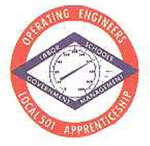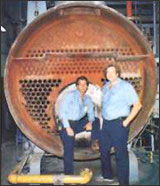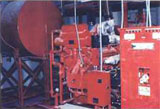

 Today is Friday April 17 2015
Today is Friday April 17 2015




 |
Stationary EngineersOperating and Maintenance Engineer TradeJoint Apprenticeship Committee for Southern Nevada 313 Deauville St. · Las Vegas, Nevada 89106 (702) 385-5005 · Fax (702) 385-3255 |
Nature of the Work
Every community relies on power-generating equipment to run industrial and other machinery and provide heat, light, and ventilation to offices and homes. Stationary engineers operate maintain, and repair this equipment, including steam boilers, high temperature hot water boilers, diesel engines, turbines, generators, pumps, condensers, and compressors.
Stationary engineers start up and shut down equipment in order to meet demands for power and to insure that the equipment is operating economically and within established limits. They monitor meters, gauges and other instruments attached to equipment and made adjustments whenever necessary. These workers must detect, identify and correct any trouble that develops.
 Working Conditions
Working Conditions
Stationary engineers generally have steady year-round employment. They usually work a 5-day, 40-hour week.
Most work one of three shifts and weekend and holiday work often is required.
Engine rooms, power plants and boiler rooms usually are clean and well lighted. Even under the most favorable conditions, however, some stationary engineers are exposed to high temperatures, dust, dirt and high noise levels from the equipment. General maintenance duties may cause contact with oil and grease, and fumes or smoke. Workers are on their feet a lot; they also may have to crawl inside boilers and work in crouching or kneeling positions to inspect, clean, or repair equipment. Because stationary engineers work around boilers as well as electrical and mechanical equipment, they must be alert to avoid burns, electrical shock, and injury from moving parts.
Physical Demands
Varied - from light to heavy work. Should be able to lift, carry, push or pull. Frequent lifting or carrying required. Should be able to climb, balance stoop, kneel, crouch, crawl, reach, handle, finger, feel, talk, hear and see.
Employment Prospects
The types of establishments in which the stationary engineer work range in size from giant electrical generating stations and large public buildings to small industrial plants. Because stationary engineers work in so many different kinds of establishments and industries, they are employed in all parts of the county. Most work is in the more heavily populated area where large industrial and commercial establishments are located.
Stationary engineers are employed in such industries as: bakeries, breweries, canneries, dairies, food processing, hotels, laundries, ice and cold storage plants, meat packing and processing, schools, hospitals, building, etc.
 Wage and Benefits
Wage and Benefits
Wage varies depending on union contacts and the industry. Benefits usually include pension and
health and welfare as per union contract with various industries.
Minimum Qualifications
To be eligible for application to the Operating and Maintenance Engineers Apprenticeship
Program, the applicant must meet the following requirements:
- 18 years of age (Birth Certificate Required)
- High School Diploma or G.E.D. Certificate
- DD-214
- Comprehend, read and write the English Language
Apprenticeship Training
The program is approximately four years, during which the apprentices will receive instruction and practical experience on the job. This "on-the-job" training is supplemented by classroom instruction in related technical subjects. The apprentice must attend classes designated by the Apprenticeship Committee two nights each week for not less than 144 hours per year. Average class hours per year at this time is 200 hours.
The stationary engineer, after completion of the Apprenticeship Program, will have a general knowledge of arithmetic, physics, chemistry, steam, refrigeration, air-conditioning, piping practices, electricity, water treatment, instrumentation and controls, mechanics, lubrication, shop procedures, safety, log and record keeping.
All Rights Reserved. © 2006.